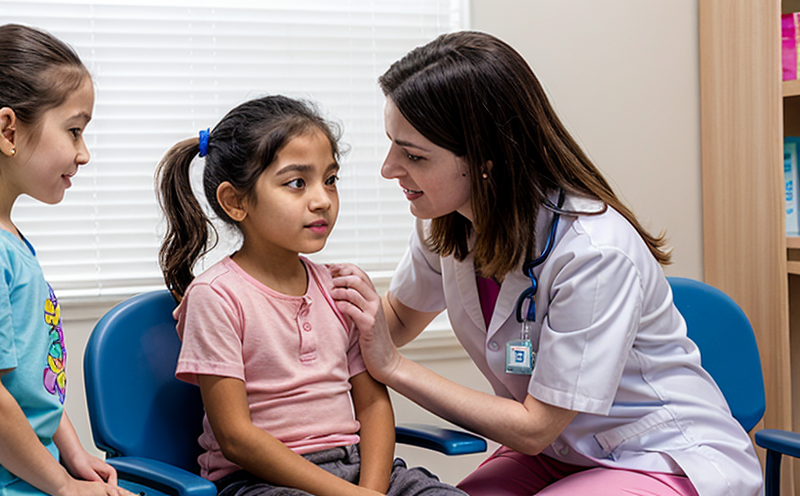Pediatric and Geriatric Microbiome Testing in Companion Animals
The pediatric and geriatric microbiome testing in companion animals represents a crucial area within clinical and healthcare testing. The human microbiome, which includes the collective genetic material of microorganisms that live on or inside the human body, has been extensively researched for its role in health and disease. Similarly, the microbial community found in pets' digestive tracts can significantly influence their overall well-being.
Microbiota plays a vital role in various physiological processes such as digestion, immune system development, and protection against pathogens. Any disruption in this delicate ecosystem could lead to gastrointestinal disorders, allergies, or even more severe health issues. Therefore, understanding the microbiome of pediatric and geriatric companion animals is essential for accurate diagnosis and effective treatment.
This testing service involves analyzing samples from young (pediatric) and older (geriatric) dogs and cats using advanced sequencing technologies like Next Generation Sequencing (NGS). The primary objective is to identify changes in microbial composition that may correlate with specific health conditions. These tests are designed not only for diagnostic purposes but also as a tool for monitoring the effectiveness of interventions aimed at restoring balance within the microbiome.
The methodology includes collecting fecal samples from pets and preparing them according to strict protocols before subjecting them to NGS analysis. Post-processing involves bioinformatics tools capable of interpreting vast amounts of genetic data generated by these sequences, allowing us to pinpoint specific species or genera that might be overrepresented or underrepresented compared to standard reference ranges.
Our laboratory adheres strictly to recognized international standards such as ISO 17025 for proficiency in performing this type of analysis. Compliance with these guidelines ensures reliability and accuracy of results provided, which is critical when making decisions about pet health management strategies.
Understanding the pediatric and geriatric microbiome is becoming increasingly important given the rising number of elderly pets due to improvements in veterinary care. With this knowledge, veterinarians can tailor treatments more precisely based on individual animal needs rather than relying solely on broad-spectrum antibiotics which may have side effects for both humans and animals.
By providing comprehensive insights into the microbial communities inhabiting companion animals during different stages of life, we aim to contribute significantly towards improving pet health outcomes. This service complements other diagnostic methods used by veterinarians while offering valuable information that supports long-term care plans designed specifically for each pet's unique microbiome profile.
Scope and Methodology
The scope of pediatric and geriatric microbiome testing encompasses the evaluation of bacterial, viral, fungal, and archaeal communities present in the gastrointestinal tract of companion animals. This analysis aims to provide a detailed overview of the microbial landscape across various age groups, highlighting differences that may arise due to natural aging or developmental stages.
Methodologically, this involves collecting fresh fecal samples from pets under two distinct categories: pediatrics (typically less than one year old) and geriatrics (over seven years old). Specimen preparation strictly follows protocols outlined in ISO 17025 ensuring consistent quality throughout the analytical process. Once prepared, samples undergo DNA extraction followed by amplification using primers targeting universal bacterial markers.
Next Generation Sequencing (NGS), specifically Illumina MiSeq technology, is employed to generate high-quality reads from extracted DNA fragments. After sequencing, raw data undergoes rigorous quality control checks before being processed through bioinformatics pipelines that map sequences back onto reference genomes. Statistical analysis then quantifies relative abundance levels of different taxa contributing to the overall microbial community profile.
Interpretation of results focuses on identifying key genera or species associated with particular health states in pediatric and geriatric populations. For instance, increased levels of certain pathogenic bacteria like Clostridium difficile may indicate potential issues related to antibiotic resistance or inflammatory bowel disease (IBD). Conversely, enhanced presence of beneficial microbes such as Lactobacillus spp could suggest successful probiotic therapy.
Reporting includes visualizations illustrating shifts in microbial composition over time along with quantitative metrics reflecting overall diversity and evenness indices. Additionally, we offer comparative analyses highlighting similarities and differences observed between age groups or within individual animals post-treatment interventions.
Industry Applications
- Diagnosis: Identifying underlying causes of gastrointestinal disorders in pediatric and geriatric pets by examining changes in their microbiomes.
- Treatment Monitoring: Assessing the efficacy of prescribed medications or dietary modifications aimed at restoring balance within the gut flora.
- New Drug Development: Providing valuable data points for researchers working on novel therapies targeting specific pathogenic species found in compromised microbial ecosystems.
- Breeding Programs: Helping breeders select healthier breeding pairs by evaluating the genetic diversity and stability of the microflora associated with successful offspring reproduction.
The insights gained from this testing can be instrumental in developing personalized treatment plans for each pet, enhancing overall quality of life. Moreover, it supports ongoing research efforts focused on understanding how environmental factors interact with the microbial community to influence health outcomes.
Why Choose This Test
Selecting our pediatric and geriatric microbiome testing service offers several advantages over traditional diagnostic approaches:
- In-depth Understanding: Provides unparalleled insight into the complex relationship between the host and its microbial community, enabling more accurate diagnoses.
- Precision Medicine: Tailored treatments based on individual animal profiles rather than one-size-fits-all solutions.
- Proactive Care: Allows early detection of potential health issues before they become serious concerns, promoting proactive management strategies.
- Evidence-Based Recommendations: Backed by scientific evidence from NGS technology, ensuring recommendations align with current best practices in veterinary medicine.
Our commitment to quality and accuracy ensures that you receive reliable results every time. By choosing us for your pediatric and geriatric microbiome testing needs, you are investing in the health and well-being of your beloved companion animals.





